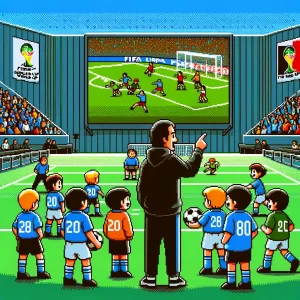
Why Soccer Referees Are Leaving—and How We Can Keep Them
Across the United States, referee shortages are putting youth and amateur soccer leagues in jeopardy. Despite the passion and commitment many referees bring to the game, an alarming number are choosing not to renew their licenses.
Why is this happening? And more importantly, what can be done to reverse the trend? Recent research into soccer referee retention sheds light on the key reasons behind the crisis and offers actionable insights to address it.
The Research: Understanding the Referee Exodus
A study conducted with current and former U.S. Soccer Federation referees in Tennessee reveals the diverse motivations behind referee turnover. The research highlights the different challenges faced by youth and adult referees, using a method called best-worst scaling to prioritize factors contributing to non-renewal.
Key Findings:
- Youth Referees:
- Cost of Refereeing: Expenses like registration fees and transportation are the top reasons youth referees leave. Many young referees rely on parents or guardians for rides to matches, adding another layer of difficulty.
- Assigning Issues: Feeling over- or under-utilized can lead to frustration among youth referees.
- Lack of Respect: Verbal abuse from players, coaches, and parents significantly impacts their decision to quit.
- Adult Referees:
- Lack of Respect: For adults, enduring verbal abuse is the leading cause of non-renewal. Unlike their younger counterparts, this group often prioritizes respect over financial considerations.
- Work Commitments: Changing work schedules and the struggle to balance refereeing with family life play a significant role.
- Organizational Support: Both youth and adult referees cite inadequate support from officiating organizations as a deterrent to continuing.
Practical Solutions for Clubs and Coaches
Addressing the referee shortage requires collaboration among clubs, coaches, players, and officiating organizations. Here are actionable steps based on the research findings:
1. Reduce Costs for Youth Referees
- Offer Scholarships or Stipends: Clubs and associations can subsidize registration fees or provide travel reimbursements for young referees.
- Group Transportation Solutions: Organizing carpools or arranging transport for youth referees can ease the logistical burden on families.
2. Promote Respect Across All Levels
- Zero-Tolerance Policies: Implement and enforce strict penalties for verbal and physical abuse toward referees.
- Education Campaigns: Run workshops for parents, coaches, and players to promote empathy and understanding of referees’ roles and challenges.
- Post-Match Debriefs: Encourage referees to report incidents, and ensure organizations provide follow-up and support.
3. Improve Assigning Practices
- Tailored Assignments: Match referees to games based on their skill level and preferences to prevent burnout and frustration.
- Transparent Scheduling: Use scheduling tools to ensure referees understand how assignments are determined and can provide input.
4. Provide Meaningful Organizational Support
- Mentorship Programs: Pair new referees with experienced ones to help them navigate challenges and build confidence.
- Continuing Education: Offer accessible training sessions that focus on stress management, conflict resolution, and situational awareness.
- Recognition Programs: Celebrate referees’ contributions with awards, shout-outs, and community events.
Broader Implications for Soccer Development
The referee crisis is not just about retaining officials—it’s a reflection of broader issues in soccer culture. Verbal abuse, lack of support, and inadequate respect for referees create an environment that discourages participation at all levels. Without proactive measures, leagues risk losing the “third team” that makes every match possible.
The findings also emphasize the importance of cultivating interpersonal relationships among referees. Whether it’s through mentorship or post-match camaraderie, fostering a sense of belonging can mitigate the stress and isolation many referees feel.
Your Turn to Kick It Off
Referees are essential to the beautiful game, but they need support from everyone involved. Here are some questions to reflect on and discuss:
- How can your club or team better support referees during and after matches?
- What steps can you take to educate parents and players about the challenges referees face?
- If you’re a referee, what changes would make you feel more supported and valued?
Share your thoughts in the comments or join the conversation on social media. Together, we can ensure soccer remains a game for everyone—on and off the field.
Elevate your understanding of the beautiful game with ‘This Week in Soccer’.
Subscribe now to our newsletter and be part of a community that transforms theoretical knowledge into practical mastery. Don’t miss out on the chance to access groundbreaking insights and redefine your approach to soccer. Subscribe today!



